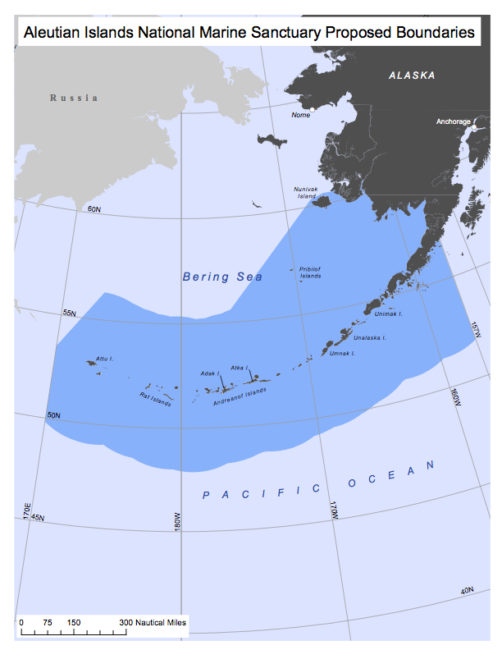
The waters around the Aleutian Islands support a dizzying range of wildlife — and major industries right along with it. Right now, the government’s job is to help find a balance.
But there’s a new campaign to permanently tip the scales toward conservation in the Aleutian Chain.
Since Congress started the national marine sanctuary program in the 1970s, only a handful of sites have gotten protection.
A lot of those are in the Pacific — including the biggest reserve in the United States. But according to Rick Steiner, it was pretty quiet to begin with.
“There’s no one living there,” Steiner says. “There’s not a lot of shipping in the area. There’s virtually no commercial fishing. So the threats in that area are nowhere near what they are in the Aleutians and the southeastern Bering Sea.”
That’s the zone that Steiner and other marine conservationists want to turn into a federal sanctuary.
They’ve nominated a swath that stretches all the way to Nunivak Island near Bethel. It’s almost twice as big as the country’s largest reserve — even after President Barack Obama expanded it this year.
But Steiner says the exact size is negotiable. What matters is that the administration seems to be looking for a way to leave a mark.
“If the White House really wants to roll up its sleeves and get bold about ocean conservation — which it pretends it wants to — then we need to see it,” Steiner says. “And the place to start and the time to start is right now in the Aleutian Islands.”
If it’s accepted, the National Oceanic and Atmospheric Administration could make new rules to protect the Aleutian ecosystem. And that could lead to tougher limits on fishing and other big industries.
Steiner says cargo ships should be sent further offshore, to prevent the risk of accidents and spills. And he also wants the agency to put the brakes on oil and gas leasing along the entire Aleutian Chain — including the Bristol Bay area.
That’s where the president recently banned lease sales. But Steiner says it’s not airtight.
“Congress could easily undo that by putting a bitter pill in a must-sign bill or a future administration could undo it,” Steiner says. “So we want that put to bed permanently.”
The same goes for a long-running conservation battle in the Aleutian Islands over an endangered population of Steller sea lions.
Federal biologists, fishing companies, and environmental groups have spent more than 15 years fighting over the best way to protect sea lions. For a while, that meant shutting down commercial fishing. But new studies showed that it probably wouldn’t hurt to relax some of those restrictions. The change went into effect the day after Christmas.
Michael LeVine has been handling the case for Oceana.
“Rather than implementing protections and removing them and fighting about their sufficiency, we need a long-term plan for this region and a commitment to maintaining the health and biodiversity of this ocean ecosystem over the long term,” LeVine says.
While LeVine works on yet another lawsuit, the sanctuary advocates want the government to try a different approach.
They’re asking NOAA to bring back the old restrictions on commercial fishing for good. And they want a new ban on bottom trawling past a certain point in the Aleutian Chain.
That’s a sticking point for Stephanie Madsen, who represents vessels in the At-Sea Processors Association. She says they’re well-suited to rough Aleutian waters.
But Madsen has deeper concerns about the sanctuary proposal as a former member of the North Pacific Fishery Management Council.
“You know, who actually gets to design fishing restrictions in a marine sanctuary?” Madsen asks. “Where [do] the jurisdictional boundaries go? Who’s on first?”
The answer to that question could be a long way off.
NOAA still has to conduct a preliminary review to figure out whether the Aleutians are eligible to become a sanctuary. That wouldn’t happen without extensive studies — and plenty of time for public hearings and public comment.
